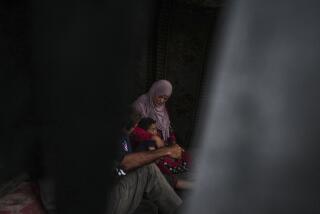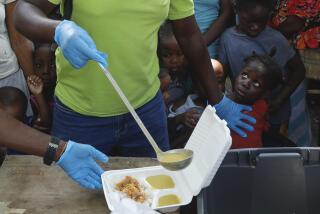Food Shortages Gnaw at Iraqis’ Stomachs, Morale
- Share via
BAGHDAD — After his American employers left, and monthly food rations began to shrink, Hussein Hadi started selling his furniture. His bed was the last thing to go.
Now Hadi, his wife, sister, mother, two brothers, three children and a nephew sleep on his living room floor in Baghdad, their blankets sewn from flour sacks.
Some nights, they fall asleep hungry. “Hope is small,” said his wife, Zainab.
Like many Iraqis, the Hadis depend on food rations distributed by the government. Sometimes the sugar they receive has been hardened by rainwater and the rice is crawling with maggots. The soap is so harsh that it causes rashes. On the rare occasions when the Hadis received all the items -- sugar, rice, flour, baby milk, tea, vegetable oil and a few other essentials -- they considered themselves lucky.
The U.N. World Food Program, which monitors the distribution of rations, recently reported “significant countrywide shortfalls in rice, sugar, milk and infant formula.” Families in Baghdad haven’t received sugar or baby milk since January. Newspapers have also begun reporting that the tea and flour handouts contain metal filings and that people have fallen ill after consuming food rations.
Officials with the Trade Ministry, which is in charge of distributing the rations, said the media have created the crisis. But they have refused to release results of the tests for contamination they said they are doing.
Retail agents who sell the food baskets say the ministry is corrupt, a charge supported by Radhi Radhi, the government’s anti-corruption chief. Radhi said in a recent interview that Trade Ministry officials had spread rumors about contaminated food to discredit the current flour supplier and renegotiate the contract.
Frustration, Suspicion
Some agents speculate that ministry employees have added metal filings to cheat on the parcels’ weight. The same employees also sell tea and flour on the black market, agents say.
Like the Hadis, many Iraqi families rely on the heavily subsidized rations, which were previously distributed under the United Nations’ oil-for-food program to mitigate the effect of sanctions after the Iraqi invasion of Kuwait. After the ouster of Saddam Hussein, the program was handed over to the Ministry of Trade.
More than half of Iraq’s population lives below the poverty line. The country’s median income fell from $255 in 2003 to about $144 in 2004, according to a recent U.N. survey. Families buy the food baskets for a few dollars at special state-licensed shops.
Ahmed Mukhtar, director general of the ministry, blamed the shortage of rations on security threats that created bottlenecks at the borders with Jordan, Syria and Turkey.
“We’re attempting to make sure the supplies are safely delivered,” Mukhtar said. “Anything that disturbs the food supplies is a critical situation.”
Zainab Hadi said she and other women have been forced to buy food at the market, pushing prices up. The cost of tea and flour has almost tripled. At local food markets, a 35-pound can of vegetable oil, which just a few months ago cost $4 -- a little more than an average day’s wage -- now costs $12.
Over the doorway of the Hadis’ tiny cinderblock house, a small, blue ceramic plaque offers praise to God. The 10 family members share two rooms. The upstairs living room doubles as a bedroom.
In their kitchen, a poster of the Shiite Muslim martyr Hussein shares pride of place with a world map. The fridge is largely empty. Sprite and Coke bottles filled with tap water share shelf space with medicine to relieve the aching joints of Hadi’s widowed mother.
Long before he went to work for the American military as an electrical engineer, Hadi fought with the Iraqi army in the war against Iran in the 1980s. A conscript, he and 15 comrades refused to join a particularly bloody offensive, he said. After they were brought from the front lines to Baghdad, nine were executed.
“We asked them, ‘Show mercy,’ ” he said, lifting his camouflage T-shirt, a gift from the Americans. Saddam Hussein’s torturers struck him with thick electrical cords, he said, leaving rope-like scars across his chest.
When U.S. troops entered Baghdad, Hadi stood in the streets, clapping. His daughter Mina came into the world a few days later, when American promises of freedom and prosperity were still fresh and Hadi’s hopes were still high. Mina was born prematurely.
Hadi disappeared into the back of the house, then reemerged, beaming. He clutched a neatly folded blue envelope and pulled out an American-made Certificate of Appreciation thanking him for serving the coalition forces. The envelope also contained a medal.
For a year, Hadi and his brothers ran electrical wire and made friends with Americans in the nearby Green Zone, which serves as the U.S. headquarters in Iraq. One of his brothers present in the house pulled out another treasure, a photocopied picture of him and other Iraqis smiling as they stand beside Army Brig. Gen. Mark Kimmitt, the spokesman for U.S.-led forces in Iraq at the time.
Kimmitt and other soldiers ended their deployment, and the Hadi brothers were dismissed. They wanted to work for the arriving troops but were turned away. The interpreters who control the hiring of other Iraqis behind the scenes wanted bribes that the family couldn’t afford, the brothers said.
One brother applied to the Iraqi national guard. But they also wanted money: $500 to consider taking him as a recruit.
Hopes Are Shrinking
Since the Americans left, the brothers have worked sporadically as minibus drivers. They are paid about $3 a day to ferry passengers around the capital and brave suicide bombers. On the roads, such attacks are indiscriminate and frequent. Getting behind the wheel means risking one’s life. Their 14-year-old nephew was killed last month, when a suicide bomber detonated explosives near the car he was riding in.
A visiting teenage neighbor wore loose, dirty bandages around his head and arms after a suicide bomber blew himself up near his van. He had been driving female students to college.
In Sadr City, a Baghdad slum into which 2 million people are crammed, the reduction in food rations also is taking a toll.
Intisan Karim, 26, lives with 24 family members in a small house. If rations continue to shrink, she joked, laughing without mirth, “we’ll start eating each other.”
Outside her house, water from a sewer flowed along the dusty streets. Goats gnawed on trash. By roadside shacks, boys sold dirty ice in buckets.
“The food basket is shrinking, and the people’s hopes are also shrinking,” said Amir Huseini, who dealt with social issues in an office affiliated with the anti-American Shiite cleric Muqtada Sadr. “These one or two missing items have become three, four and five, until this point when the really vital item -- the flour -- is also missing.”
He had visited many families locally, trying to raise morale and hope, he said, “although this does not fill the stomachs of the hungry.”
Huseini blamed the Americans for the reduced rations. But no one in the Hadi family shared that sentiment. The Americans were friends, after all.
“I wouldn’t sell the medal,” said Hussein Hadi, holding the flimsy medallion against his heart. “This is like a big prize.”
*
Times staff writers Saif Rasheed and Suhail Ahmad contributed to this report.
More to Read
Sign up for Essential California
The most important California stories and recommendations in your inbox every morning.
You may occasionally receive promotional content from the Los Angeles Times.













